六年级上册英语第二单元
- 格式:ppt
- 大小:703.00 KB
- 文档页数:12
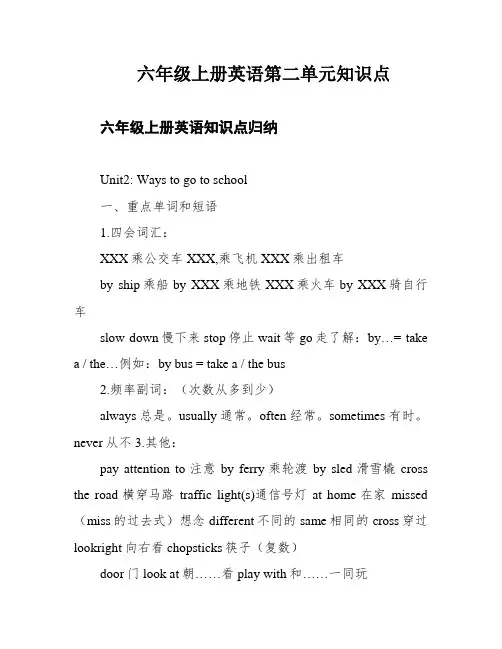
六年级上册英语第二单元知识点六年级上册英语知识点归纳Unit2: Ways to go to school一、重点单词和短语1.四会词汇:XXX乘公交车XXX,乘飞机XXX乘出租车by ship乘船by XXX乘地铁XXX乘火车by XXX骑自行车slow down慢下来stop停止wait等go走了解:by…= takea / the…例如:by bus = take a / the bus2.频率副词:(次数从多到少)always总是。
usually通常。
often经常。
sometimes有时。
never从不3.其他:pay attention to注意by ferry乘轮渡by sled滑雪橇cross the road横穿马路traffic light(s)通信号灯at home在家missed (miss的过去式)想念different不同的same相同的cross穿过lookright向右看chopsticks筷子(复数)door门look at朝……看play with和……一同玩XXX好极了2、按要求写单词:go (反义词)come。
foot(复数)feet。
child(复数)childrengood(反义词)bad坏的take带走(反义词)bring拿来slow慢的(反义词)quick/fastgo(过去式)went。
do(过去式)did。
do(第三人称单数)doesgo(第三人称单数)goes。
same相同的(反义词)different不同的miss(过去式)missedwrong毛病(反义词)right精确can(否认体式格局)can’t。
early早的(反义词)late晚的3、重点句子(一)四会句子1.--- How do you come to school?你(们)怎样来黉舍的?--- Usually。
I come on foot。
= Usually。
I walk.通常情况下,我步行来。
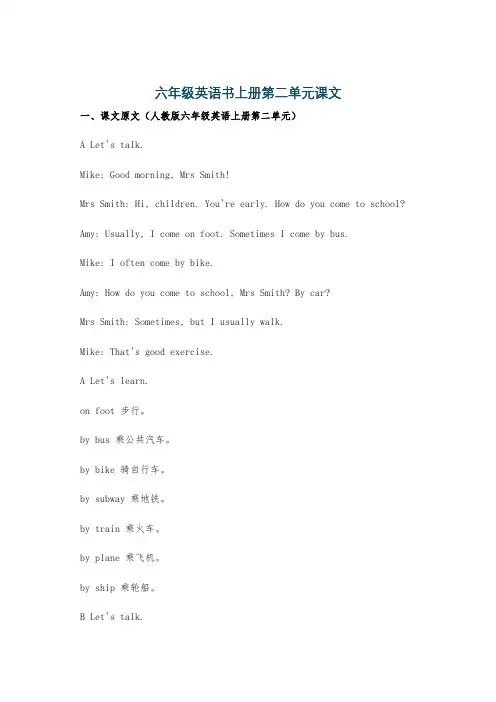
六年级英语书上册第二单元课文一、课文原文(人教版六年级英语上册第二单元)A Let's talk.Mike: Good morning, Mrs Smith!Mrs Smith: Hi, children. You're early. How do you come to school? Amy: Usually, I come on foot. Sometimes I come by bus.Mike: I often come by bike.Amy: How do you come to school, Mrs Smith? By car?Mrs Smith: Sometimes, but I usually walk.Mike: That's good exercise.A Let's learn.on foot 步行。
by bus 乘公共汽车。
by bike 骑自行车。
by subway 乘地铁。
by train 乘火车。
by plane 乘飞机。
by ship 乘轮船。
B Let's talk.Liu: Mr Jones, how can I get to the Fuxing Hospital?Mr Jones: Take the No. 57 bus over there.Liu: Thanks. Wow! So many pictures of bikes!Mr Jones: They're from my cousin in the USA.Liu: What's this?Mr Jones: A helmet. In the USA people on bikes must wear one.Liu: I see. Oh, the bus is coming! Bye, Mr Jones.Mr Jones: Hey, don't go at the red light!Liu: Oh, right! Thanks. I must pay attention to the traffic lights!B Let's learn.traffic lights 交通灯。
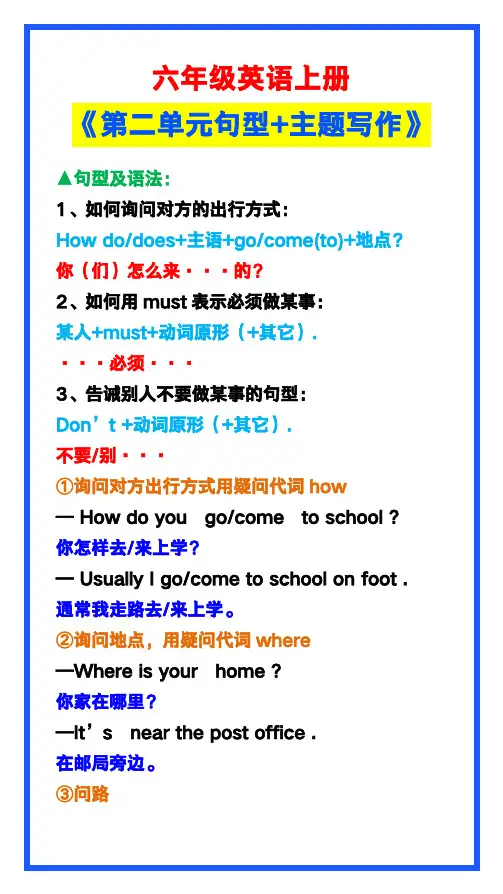
六年级英语上册《第二单元句型+主题写作》▲句型及语法:1、如何询问对方的出行方式:How do/does+主语+go/come(to)+地点?你(们)怎么来···的?2、如何用must表示必须做某事:某人+must+动词原形(+其它).···必须···3、告诫别人不要做某事的句型:Don’t +动词原形(+其它).不要/别···①询问对方出行方式用疑问代词how— How do you go/come to school ?你怎样去/来上学?— Usually I go/come to school on foot . 通常我走路去/来上学。
②询问地点,用疑问代词where—Where is your home ?你家在哪里?—It’s near the post office .在邮局旁边。
③问路—How can/ do I get to the Fuxing Hospital? 我怎么到福星医院?—You can take the No .1 bus .④交通规则(traffic rules )Slow down and stop at a yellow light黄灯面前要减速并停下来▲主题写作:介绍去上学所采用的出行方式模板:1、说明自己家到学校的距离My home is (not) far from /near the school.2、说明自己的出行方式I often /usually go to school …Sometimes I go …3、说明选择该出行方式的原因或好处It is good exercise./It is fast.范文:Don’t Be Against the Traffic RulesI go to school from Mondays to Fridays. I go to school by bike at 7:30 in the morning.I have to cross two busy roads.I know the traffic rules well.Slow down and stop at a yellow light.Stop and wait at a red light.Go at a green light.I always ride on the right side of the road.I am never against the traffic rules。
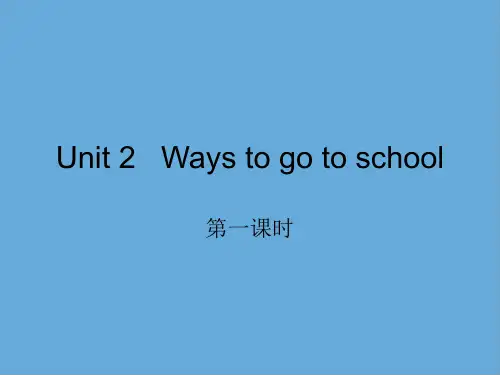
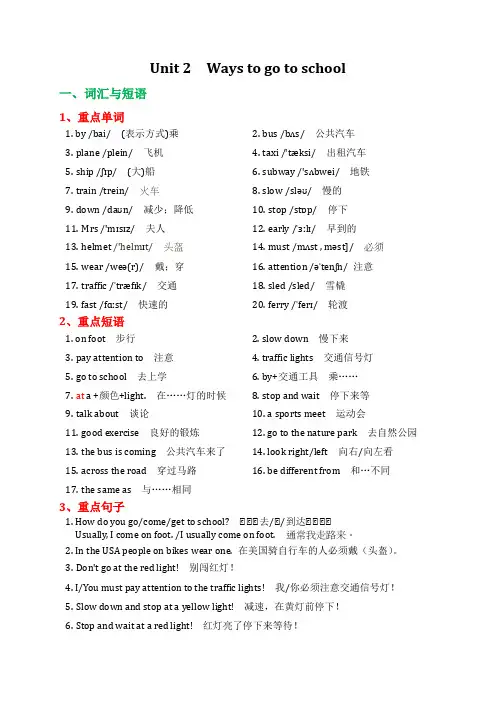
Unit 2 Ways to go to school一、词汇与短语1、重点单词1. by /bai/ (表示方式)乘2.bus /bʌs/ 公共汽车3.plane /plein/ 飞机4.taxi /'tæksi/ 出租汽车5.ship /ʃɪp/ (大)船6.subway /'sʌbwei/ 地铁7.train /trein/ 火车8.slow /sləʊ/ 慢的9.down /daʊn/ 减少;降低10.stop /stɒp/ 停下11.Mrs /'mɪsɪz/ 夫人12.early /ˈɜːlɪ/ 早到的13.helmet /'helmɪt/ 头盔14.must /mʌst , məst]/ 必须15.wear /weə(r)/ 戴;穿16.attention /əˈtenʃn/ 注意17.traffic /ˈtræfɪk/ 交通18.sled /sled/ 雪橇19.fast /fɑːst/ 快速的20.ferry /ˈferɪ/ 轮渡2、重点短语1. on foot 步行2.slow down 慢下来3.pay attention to 注意4.traffic lights 交通信号灯5.go to school 去上学6.by+交通工具乘……7.at a +颜色+light. 在……灯的时候8.stop and wait 停下来等9.talk about 谈论10.a sports meet 运动会11.good exercise 良好的锻炼12.go to the nature park 去自然公园13.the bus is coming 公共汽车来了14.look right/left 向右/向左看15.across the road 穿过马路16.be different from 和…不同17.the same as 与……相同3、重点句子1. How do you go/come/get to school? 你你你去/你/到达你你你你Usually, I come on foot. /I usually come on foot. 通常我走路来。

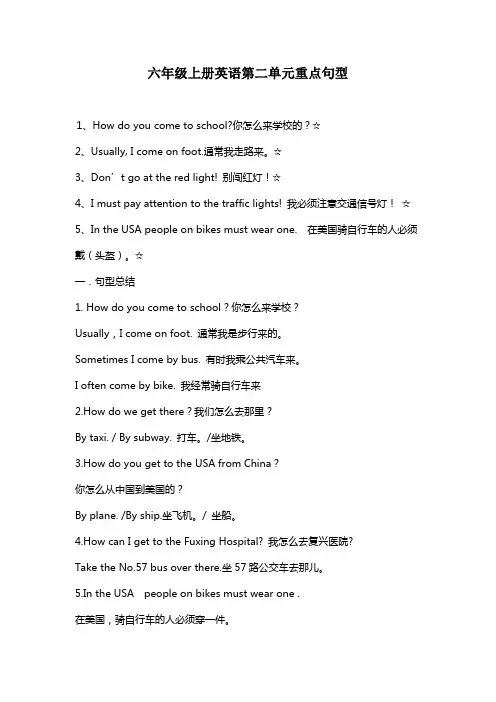
六年级上册英语第二单元重点句型1、How do you come to school?你怎么来学校的?☆2、Usually, I come on foot.通常我走路来。
☆3、Don’t go at the red light! 别闯红灯!☆4、I must pay attention to the traffic lights! 我必须注意交通信号灯!☆5、In the USA people on bikes must wear one. 在美国骑自行车的人必须戴(头盔)。
☆一.句型总结1. How do you come to school?你怎么来学校?Usually,I come on foot. 通常我是步行来的。
Sometimes I come by bus. 有时我乘公共汽车来。
I often come by bike. 我经常骑自行车来2.How do we get there?我们怎么去那里?By taxi. / By subway. 打车。
/坐地铁。
3.How do you get to the USA from China?你怎么从中国到美国的?By plane. /By ship.坐飞机。
/ 坐船。
4.How can I get to the Fuxing Hospital? 我怎么去复兴医院?Take the No.57 bus over there.坐57路公交车去那儿。
5.In the USA people on bikes must wear one .在美国,骑自行车的人必须穿一件。
6.I must pay attention to the traffic lights!我必须注意交通灯7.Slow down and stop at a yellow light.减速,在黄灯处停下来。
Stop and wait at a red light.红灯要停下来等一会。
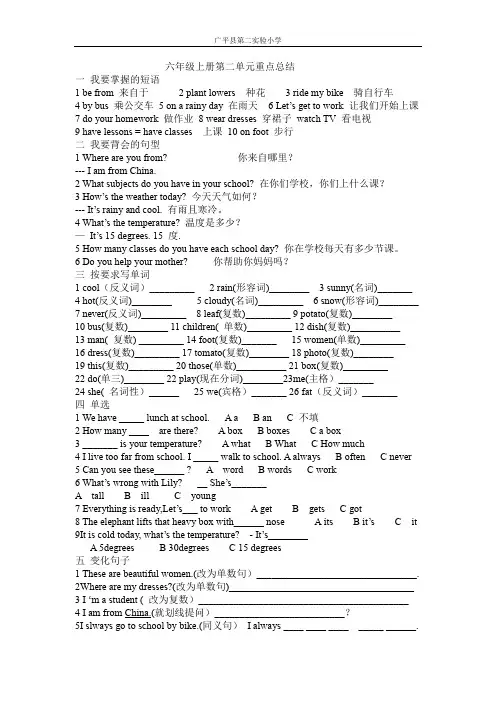
六年级上册第二单元重点总结一我要掌握的短语1 be from 来自于2 plant lowers 种花3 ride my bike 骑自行车4 by bus 乘公交车5 on a rainy day 在雨天6 Let’s get to work 让我们开始上课7 do your homework 做作业8 wear dresses 穿裙子watch TV 看电视9 have lessons = have classes 上课10 on foot 步行二我要背会的句型1 Where are you from? 你来自哪里?--- I am from China.2 What subjects do you have in your school? 在你们学校,你们上什么课?3 How’s the weather today? 今天天气如何?--- It’s rainy and cool. 有雨且寒冷。
4 What’s the temperature? 温度是多少?—It’s 15 degrees. 15 度.5 How many classes do you have each school day? 你在学校每天有多少节课。
6 Do you help your mother? 你帮助你妈妈吗?三按要求写单词1 cool(反义词)_________2 rain(形容词)________3 sunny(名词)_______4 hot(反义词)________5 cloudy(名词)_________6 snow(形容词)________7 never(反义词)_________8 leaf(复数)_________9 potato(复数)________10 bus(复数)________ 11 children( 单数)_________ 12 dish(复数)__________13 man( 复数) _________ 14 foot(复数)_______ 15 women(单数)_________ 16 dress(复数)_________ 17 tomato(复数)________ 18 photo(复数)________19 this(复数)_________ 20 those(单数)__________ 21 box(复数)_________22 do(单三)________ 22 play(现在分词)________23me(主格)_______24 she( 名词性)______ 25 we(宾格)_______ 26 fat(反义词)_______四单选1 We have _____ lunch at school. A a B an C 不填2 How many ____ are there? A box B boxes C a box3 _______ is your temperature? A what B What C How much4 I live too far from school. I _____ walk to school. A always B often C never5 Can you see these______ ? A word B words C work6 What’s wrong with Lily? __ She’s_______A tallB illC young7 Everything is ready,Let’s___ to work A get B gets C got8 The elephant lifts that heavy box with______ nose A its B it’s C it 9It is cold today, what’s the temperature? - It’s________A 5degreesB 30degreesC 15 degrees五变化句子1 These are beautiful women.(改为单数句)________________________________. 2Where are my dresses?(改为单数句)_____________________________________3 I ‘m a student ( 改为复数)__________________________________________4 I am from China.(就划线提问)__________________________?5I slways go to school by bike.(同义句)I always ____ ____ ____ _____ ______.6These are boys and girls.(同义句)These are_________.7 She often goes to school on foot.(同义句)She often_____ ______ ______.8 What’s the weather today?(圈出错处并改正)______________________?9 How many child are there in your family?(圈出错处并改正)______________________ ?六本单元的重点单词1 umbrella 雨伞I always have my ambrella on a rainy day.2 driver 司机This is our bus driver,3 well 健康4 ill 病的The chicken is ill. 小鸡生病了。
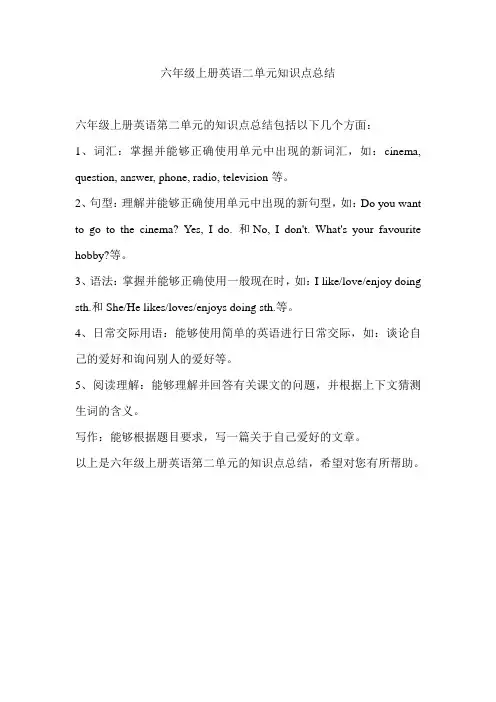
六年级上册英语二单元知识点总结
六年级上册英语第二单元的知识点总结包括以下几个方面:
1、词汇:掌握并能够正确使用单元中出现的新词汇,如:cinema, question, answer, phone, radio, television等。
2、句型:理解并能够正确使用单元中出现的新句型,如:Do you want to go to the cinema? Yes, I do. 和No, I don't. What's your favourite hobby?等。
3、语法:掌握并能够正确使用一般现在时,如:I like/love/enjoy doing sth.和She/He likes/loves/enjoys doing sth.等。
4、日常交际用语:能够使用简单的英语进行日常交际,如:谈论自己的爱好和询问别人的爱好等。
5、阅读理解:能够理解并回答有关课文的问题,并根据上下文猜测生词的含义。
写作:能够根据题目要求,写一篇关于自己爱好的文章。
以上是六年级上册英语第二单元的知识点总结,希望对您有所帮助。
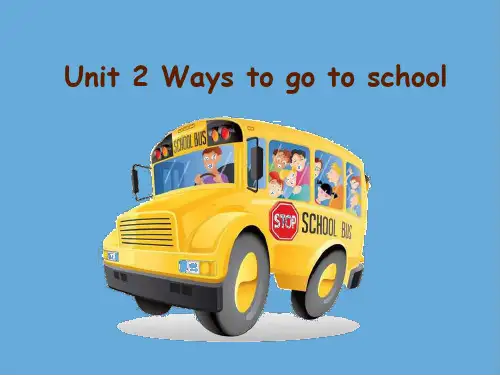
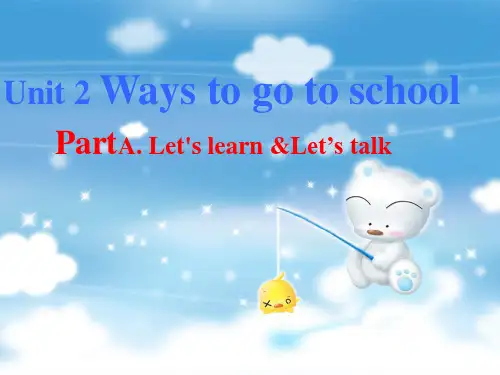
六年级上册英语第二单元知识点归纳1.重点单词:by bike骑自行车by bus坐公车by train坐火车by plane坐飞机byship坐轮船by subway坐地铁by taxi 乘出租车on foot= walk 走路Excuse me打扰一下please请buy买want to想要a pair of一双get on上车get off下车turn left左转turn right右转am上午pm下午now现在look for寻找top停止wait等待get to到达driver司机must必须2.重点句子:1.Let’s go to the nature park,让我们一起去公园吧!2.How do we get there?我们怎样到达这里?By bus乘公交。
3.The park is over there,公园在那里。
4.Let’s go .我们一起出发吧!5.Slow down and stop at a yellow light.黄灯等一等。
6.Stop and wait at a red light.红灯停。
7.Go at a green light.绿灯行。
3.重点知识:1.Is there 开头的问句怎么回答呢?例如:Is there a cinema near here?只要把前两个词语的顺序换一下就可以了,肯定回答是:Yes, there is.否定:No, there isn’t.2.buy和by的区别,这两个词语发音相同,但是意思完全不同。
by:乘,坐buy:买3.地点名词前面一定要有the。
例如:Where is the cinema?How can I get to the hospital?4.时间前面用at. 例如:在三点钟:at 3 o’ clock.;一段时间前面用for,例如:三分钟for 3 minutes.星期前面用on。
例如:on Monday, on Tuesday, on Wednesday,on Thursday, on Friday, on Saturday, on Sunday.5.在表达第几路公交车时,注意No. 的书写,N要大写,后面别少了一点6.在哪里上下车,在哪里左右转,都用介词at,例如:Get on/ off at the cinema. 在电影院的地方上下车。
六年级上册英语第二单元教案5篇能力目标:能听懂,会说要求的单词和句子情感价值:进一步提高对英语学习的热忱,培养更加稳定的学习兴趣。
能乐观主动地参与课堂活动,在情景对话中大胆开口,主动仿照。
教学重点学习和练习正确书写四会单词和四会句子.教学难点正确使用代词this和that。
课时数 2教学过程 1.热身 / 复习(Warming-up / Revision)1)播放课本附录中的歌曲I want to be your friend, 渲染课堂气氛。
2)把小动物面具挂在墙上,让学生说出它们是什么动词,是谁的。
2.新课导入(Presentation)1)展示本课教学挂图,让学生观察,并提出问题:What are Peter and Lisa doing?What are they talking about?2)播放本课录音,让学生听,然后讨论自己的猜想是否正确。
3)再放录音,让学生认真听:谁扮演bear?谁的头饰找不到了?最终找到了吗?4)指导学生跟读录音。
5)让学生四人一组分角色表演会话。
6)鼓励学生戴面具到讲台上来表演。
3.趣味操练(Practice)1)老师将全班划分成6~8个小组,每组发一张白纸,每张白纸的最上面都写有“失物招领处”。
要求每组画出3~4种物品,供其它组认领。
2)每组分成两部分,一部分当失主去其它组找丢失物品,另一部分留在本组供应物品。
用所学句型进行交际活动。
3)播放本课投影片,让学生边看边配音。
4. 拓展活动(Additional activities)1)回家听本课录音,仿照语音语调。
2)把本课对话改编或故事,讲给父母听。
课后反思六班级上册英语第二单元教案2教学目标学问目标:能够听、说、读、写的单词和句子是:coat, jacket, jeans, shoes;Is this his coat? Yes, it is. Is that his jacket? No, it isnt.能力目标:能听懂,会说要求的单词和句子情感价值:进一步提高对英语学习的热忱,培养更加稳定的学习兴趣。
人教版六年级上册英语unit2解析Unittwo:Ways to go to school第二单元:去学校的方式1、Wait! Don't go at the red light!等一下!不要闯红灯!Sorry.对不起。
You must pay attention to the traffic lights.你必须注意交通信号灯。
Good morning, John.How do you go to school?早上好,约翰。
你怎么来学校?I often go by subway.我经常乘地铁。
Hi, Mike. Is this your bike?嗨,迈克。
这是你的自行车吗?Yes.是的。
Nice!漂亮!Thanks. How do you come to school?谢谢。
你怎么来学校?I usually come on foot.我通常步行来学校。
How do/does+主语+come/go to ...?第三人称用does,其他用do例:How do you come to school?你怎么来学校?How does Amy come to school?艾米怎么来学校?always总是频率100%I always go to school on foot.我总是走路去学校。
usually通常频率80%I usually play football on weekend.我周末经常踢足球。
often经常频率50%He often does his homework on Saturday.他经常在星期六写作业。
sometimes有时,频率20%Sometimes she goes shopping with her mother.她有时和她妈妈一起购物。
never从不,频率0%He is never late for school.他上学从来不迟到2、Let's try让我们试试听力材料Amy:Morning, Mike.艾米:早上好,迈克。
6年级上册英语第二单元单词人教版六年级上册英语第二单元单词。
1. on foot [ɒn fʊt] 介词短语,步行。
2. by [baɪ] 介词,乘(交通工具)3. bus [bʌs] 名词,公共汽车。
4. plane [pleɪn] 名词,飞机。
5. taxi [ˈtæksi] 名词,出租汽车。
6. ship [ʃɪp] 名词,船。
7. subway [ˈsʌbweɪ] 名词,地铁。
8. train [treɪn] 名词,火车。
9. slow [sləʊ] 形容词,慢的。
10. down [daʊn] 副词,减少;降低。
11. slow down [sləʊ daʊn] 动词短语,慢下来。
12. stop [stɒp] 动词,停下;停止。
13. Mrs [ˈmɪsɪz] 名词,夫人;太太(用于已婚女子的姓氏或姓名前)14. early [ˈɜːli] 形容词,早到的;提前的。
15. helmet [ˈhelmɪt] 名词,头盔。
16. must [mʌst] 情态动词,必须。
17. wear [weə(r)] 动词,戴;穿。
18. attention [əˈtenʃn] 名词,注意。
19. pay attention to [peɪəˈtenʃn tuː] 动词短语,注意。
20. traffic [ˈtræfɪk] 名词,交通。
21. traffic lights [ˈtræfɪk laɪts] 名词短语,交通信号灯。
22. Munich [ˈmjuːnɪk] 名词,慕尼黑(德国城市)23. Germany [ˈdʒɜːməni] 名词,德国。
24. Alaska [əˈlæskə] 名词,阿拉斯加州(美国州名)25. sled [sled] 名词,雪橇。
26. fast [fɑːst] 形容词,快的。
27. ferry [ˈferi] 名词,轮渡。
28. Papa Westray [ˌpɑːpəˈwestreɪ] 名词,帕帕韦斯特雷岛。